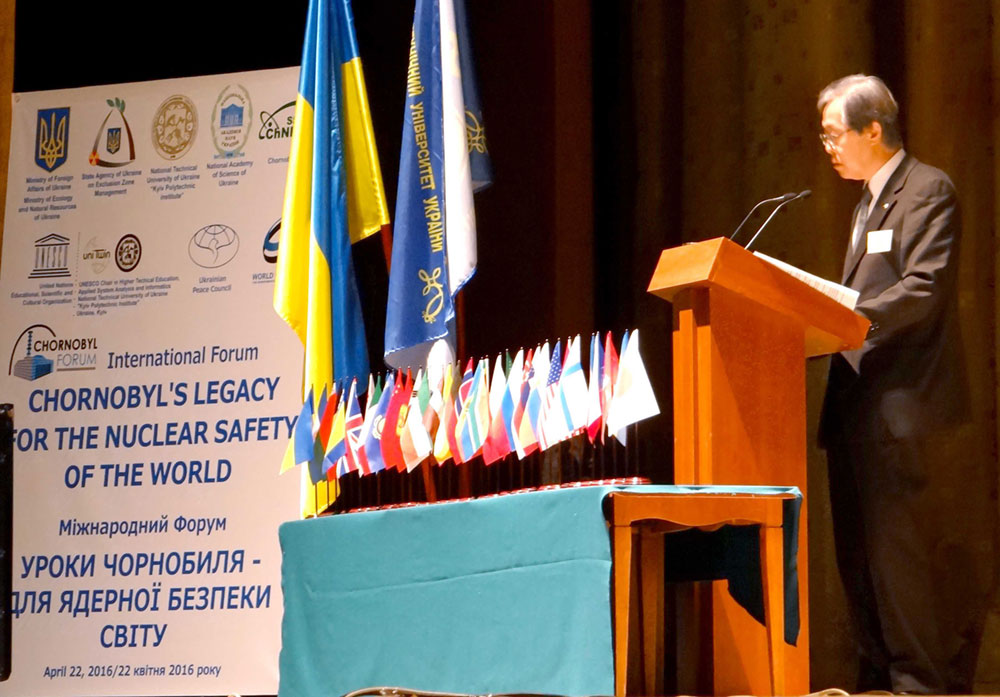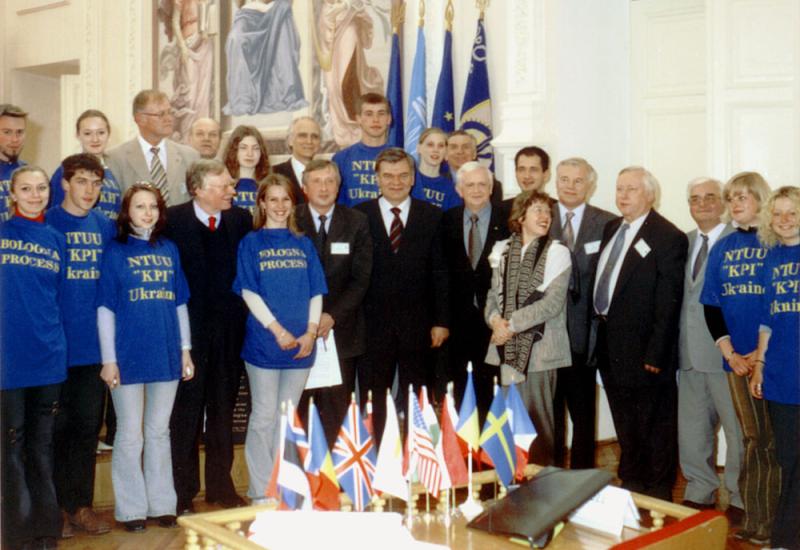This year marks the quarter-century since the UNESCO Chair was established at Igor Sikorsky Kyiv Polytechnic Institute. It was created under a bilateral agreement between UNESCO and Igor Sikorsky Kyiv Polytechnic Institute, which was concluded in early 1999 within the framework of the UNITWIN/UNESCO Chairs Program in pursuance of the Memorandum of Cooperation between the Government of Ukraine and UNESCO of November 18, 1997.
About UNESCO
and the UNITWIN/UNESCO Chairs Program
There is hardly any need to explain what UNESCO is: the abbreviation of the English name of the United Nations Educational, Scientific and Cultural Organization, established in late 1946, is probably familiar to everyone. But what is the International Networking Program of UNITWIN (also known as the University Twinning and Networking Program), the general public knows less. And this program is very important for educators, as it ensures the creation of networks of partner universities and UNESCO Chairs in the areas of educational policy, scientific developments and projects, applied research in the natural and social sciences, cultural initiatives, communication and information at the global, interstate and regional levels.
The UNITWIN/UNESCO Chairs Program was launched in 1992. Now, under its auspices, there are almost 900 UNESCO Chairs in more than 120 countries. In Ukraine, 14 such chairs have already been established. However, due to the war, only 12 of them are currently operating, as 2 were opened at universities that were in the temporarily occupied territories. These are specialized chairs that primarily promote the development of international scientific cooperation, as the Program helps to improve the activities of higher education institutions in this area, mobilize university expertise and cooperate within the framework of the UNESCO 2030 Agenda for Sustainable Development, etc.
It should be noted that the areas of activity of the departments at specific universities are in line with the main educational and scientific areas in which they train students and conduct research. Of course, not all areas, since universities are mostly multidisciplinary, but those that are among the key ones in the educational and research activities of certain educational institutions.
The ICU "Higher Technical Education,
Applied Systems Analysis and Informatics"
Thus, the UNESCO International Chair (or, in short, ICU), which operates at the National Technical University of Ukraine "Igor Sikorsky Kyiv Polytechnic Institute", is called "Higher Technical Education, Applied Systems Analysis and Informatics". More precisely, it was opened at the KPI and the Educational and Scientific Complex "Institute of Applied Systems Analysis". That is, the main goal of our ICU is to implement a comprehensive research program in the field of higher technical education, methods of applied systems analysis, the latest information technologies and their application in the education system, to analyze complex systems of various nature, such as environmental, economic, social, technical and other, including in the field of sustainable development.
The agreement on the establishment of the UNESCO International Chair at Igor Sikorsky Kyiv Polytechnic Institute was signed by the then Director-General of UNESCO Federico Major Zaragoza and the rector of the university, academician of the National Academy of Sciences of Ukraine Mykhailo Zgurovsky, who headed it. Soon, the ICU KPI began to play the role of one of the very important bridges of communication and tools for establishing partnerships between Kyiv Polytechnic and foreign universities, scientific organizations, centers and international organizations. Moreover, it has become a real launching pad for the implementation of the best European and world practices in the organization of universities and the country's education sector in general in Ukraine. For example, it was the ICU KPI that was one of the main drivers of the integration of the national higher education sector into the processes of harmonization of educational systems of European countries and the development of a single European research area, especially the Bologna Process. No wonder that in May 2004, the university hosted an international seminar "Higher Education in Ukraine and the Bologna Process", organized by the UNESCO European Center for Higher Education (UNESCO-CEPES), the ICU with the assistance of the Council of Europe and the European Association of Universities and with the participation of the Ministry of Education and Science of Ukraine. A number of decisions and approaches developed during this representative event of educators and Ukrainian government officials, to a certain extent, formed the basis for further structural reform of the entire Ukrainian higher education system.
By the way, holding this conference on the basis of Kyiv Polytechnic was quite logical, because a year before, in September 2003, the head of the UNESCO Chair, university rector Mykhailo Zgurovsky, as an authorized representative of KPI, signed the Magna Charta Universitatum, the Magna Charta of European Universities, which defined a new role for universities in the transition from elite to mass higher education, without which rapid development of the European continent is impossible. At the same time, the document also emphasized the need to preserve and develop the traditions of higher education that had been developed over the centuries. At that time, more than 430 universities joined the Charter. Today, there are more than 900 of them, and the document itself has received a new version, which Mykhailo Zgurovsky signed in May 2020 as a signatory to the first version.
A significant milestone in the development of Ukrainian higher education was the implementation of the joint project with UNESCO-CEPES "Development of Conceptual Framework and Tools for Rating Domestic Educational Institutions" on the basis of the KPI ICU. The result of this project was the first ranking of Ukrainian higher education institutions, Top 200 Ukraine, published in 2004. Now this rating is not only one of the most authoritative in our country, but also so familiar that it seems to have always existed.
ICU as a creative laboratory
It should be emphasized that all the proposed methods and standards of a modern Ukrainian university in the international sphere were tested primarily in the university's departments. "The UNESCO Chair of Igor Sikorsky Kyiv Polytechnic Institute is a creative laboratory. It was envisaged from the very beginning of its existence. That is, our teachers and professors are engaged in their work and, with its support, conduct scientific and methodological activities, implement certain projects. This testifies to the high status of these endeavors, draws more attention to them, and allows us to attract new partners," says the department's secretary, Professor Serhii Shukaiev.
And this is quite true, because the experience gained in implementing forms and areas of work that are new to domestic universities but familiar to foreign partners is subsequently shared with other Ukrainian higher education institutions, taking into account, of course, their specifics and profiles of training.
Of course, the activities of the ICU are not limited to the development of higher education, as it was created as a basic international unit of the UNITWIN/UNESCO Chair in Ukraine International Program on Applied Systems Analysis and Informatics. Thus, in cooperation with influential international organizations and individual universities from different countries, the ICU launched a series of international congresses, conferences, and seminars on various aspects of supporting and developing research and training in these fields. Such events not only provided scientists and educators from different countries with the opportunity to discuss the most pressing specific problems of computer science and systems analysis and ways to solve them, but also, in a broader sense, contributed to the understanding of the modern role of natural sciences and higher technical education in the human dimension. This is extremely important given that these areas of scientific and educational activity are developing particularly dynamically in modern conditions and are literally changing the world and the conditions of human existence before our eyes.
About projects and events
If you delve a little deeper into the organizational and educational activities of the UNESCO Chair, you will notice that it contributes not only to ensuring joint analytical activities with partners, but also to quite specific things. For example, in 2005, the UNESCO Chair and the Faculty of Management and Marketing organized a training program for university specialists in the field of International Activity Management. The launch of such training within the university was made possible by a grant provided by UNESCO for the project "Technical and Methodological Support for the International Project Management Curriculum."
Returning to the scientific and educational events that were held with the assistance and direct participation of the UNESCO Chair of Igor Sikorsky Kyiv Polytechnic Institute, it should be noted that the list of events alone is so long that it would not take a whole newspaper column to print it. Therefore, we will mention only the most important ones that have been organized over the past few years. These are the Higher Education Forum - the Congress of Rectors of the Black Sea Region Universities Network, the CODATA International Conference "Scientific Information for Society: From the Present to the Future", the annual All-Ukrainian Festival of Innovative Projects "Sikorsky Challenge", which has been held since 2012, the traditional annual International Scientific and Practical Conference "Clean Water. Fundamental, Applied and Industrial Aspects", as well as the annual International Scientific and Practical Conference "Renewable Energy and Energy Efficiency in the 21st Century", the Forum of Rectors of Higher Technical Educational Institutions of Ukraine and the Republic of Poland, and many others.
New horizons of the ICU KPI activity
On February 29 this year, the UNESCO Chair "Higher Technical Education, Applied Systems Analysis and Informatics" of Igor Sikorsky Kyiv Polytechnic Institute has a new direction of activity: it has become a center for uniting all Ukrainian UNESCO Chairs around the idea of expanding the environment of Ukrainian institutions operating in the international field on very similar basic statutory principles. The main areas of joint activity were enshrined in a Memorandum of Cooperation between all twelve Ukrainian UNESCO Chairs and the Ukrainian Peace Council, the National Academy of Pedagogical Sciences of Ukraine, and the National Center "Minor Academy of Sciences of Ukraine." "We started organizing certain joint events earlier, we worked together in different formats, and the experience of this interaction has shown that it is advisable to formalize it," Mykhailo Zgurovsky emphasized before signing the document, "This is necessary in order to more actively promote the basic principles on which the activities of our organizations are based, and, most importantly, the Ukrainian Formula for Peace.
"Peace" is perhaps the most important word in the current activities of UNESCO and its bodies. Therefore, UNESCO Chairs, including the Department of Kyiv Polytechnic, have actively joined the work on discussing and preparing the draft outcome document of the UN Future Summit, which is scheduled for September 2024. The first seminar of UNITWIN departments and networks within this work was held in early March. The next one - "International Peace and Security" - is scheduled for May 16. Hopefully, the voice of Kyiv Polytechnic will be heard there.
Dmytro Stefanovych
Photo captions:
International seminar "Higher Education in Ukraine and the Bologna Process", organized by the UNESCO European Center for Higher Education (UNESCO-CEPES) and Igor Sikorsky Kyiv Polytechnic Institute with the support of the Council of Europe. It was at this seminar that UNESCO adopted a recommendation in May 2004 to the Bologna Secretariat in Bergen (Norway) to accept Ukraine as an official member of the Bologna Process.

International Forum "Lessons from Chornobyl for the World's Nuclear Safety", organized by Igor Sikorsky Kyiv Polytechnic Institute on April 20-23, 2016. First plenary session "Chornobyl and the New Strategy for Nuclear Safety of the World". Toichi Sakata, Ambassador Extraordinary and Plenipotentiary of Japan to Ukraine in 2011-2014, Special Advisor to the President of the Japan Atomic Energy Agency (JAEA), presents a report "The World Community in Search of International Nuclear Safety Assurances".

